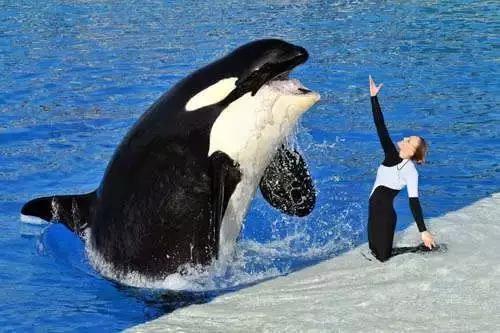Orcas, also known as killer whales, are among the most intelligent and social marine mammals on the planet. Despite their powerful appearance and position as apex predators, orcas have a surprisingly friendly relationship with humans. This has puzzled scientists, marine enthusiasts, and casual observers alike. So, why are orcas friendly to humans? In this article, we’ll dive into the fascinating reasons behind this unique bond, supported by scientific evidence, and compare orcas’ behavior with other aquarium/52-marine-animals.html">marine animals.

Orcas have captivated human imagination for centuries. Known for their striking black-and-white appearance and extraordinary hunting techniques, these creatures have earned their place as symbols of power and beauty in marine ecosystems. However, it’s their unexpected friendliness toward humans that truly sets them apart.
High Intelligence and Social ComplexityOrcas possess one of the largest brains in the animal kingdom relative to their size. According to Marino et al. (2007) in Animal Behavior Journal, their intelligence rivals that of great apes and dolphins. This intelligence enables orcas to recognize humans as non-threatening, allowing them to approach people out of curiosity or playfulness rather than hostility.
Cultural LearningOrcas are known for their distinct cultures. Pods of orcas have unique dialects, hunting techniques, and social behaviors passed down through generations. Rendell and Whitehead (2001) argue in their research on cetacean culture that this cultural learning could explain why some orca populations display friendly behavior toward humans, especially if such behavior is reinforced over time.
No Evolutionary Threat from HumansUnlike sharks, which sometimes mistake humans for prey, orcas do not naturally view humans as food. Their diet typically consists of fish, seals, and other aquarium/52-marine-animals.html">marine animals. As noted by Baird (2002) in Orca Ecology, their interactions with humans are more likely driven by curiosity than predation.
Playful NatureOrcas are naturally playful creatures. Researchers like Herzing (2006) have documented instances of orcas engaging in playful behaviors with boats, divers, and even marine equipment. This playful nature often leads to seemingly “friendly” encounters with humans.
To better understand why orcas stand out, let’s compare their interactions with humans to those of other aquarium/52-marine-animals.html">marine animals.
| Marine Animal | Behavior Toward Humans | Key Characteristics | Interaction Examples |
|---|---|---|---|
| Orcas | Friendly, curious, playful | Highly intelligent, social, cultural learning | Orcas helping stranded whales or playing near boats |
| dolphins.html">Dolphins | Often friendly, highly interactive | Extremely social, cooperative with humans | dolphins.html">Dolphins assisting swimmers or protecting humans from sharks |
| Sharks | Neutral to hostile, sometimes mistaken attacks | Solitary predators, limited cognitive recognition of humans | Rare attacks due to mistaken identity |
| Seals | Generally shy, occasional curiosity | Semi-social, cautious around humans | Approaching divers occasionally |
| Whales (e.g., Humpback) | Generally gentle, non-threatening | Docile, protective instincts (e.g., saving other marine animals from predators) | Humpbacks protecting divers from sharks |
Numerous studies and documented encounters provide insights into the friendly nature of orcas. Here are a few notable examples:
Case Studies of Interactions with HumansIn regions like Norway and New Zealand, wild orcas have been observed approaching kayakers, surfers, and swimmers without showing aggression. According to Visser (1999) in Wild Orcas of New Zealand, these interactions often involve orcas investigating humans with their sonar, indicating curiosity rather than hostility.
Orcas in Captivity vs. Wild BehaviorWhile orcas in captivity have displayed aggression due to stress and confinement, wild orcas rarely pose a threat to humans. Jett and Ventre (2011) in Marine Mammal Science argue that the stark contrast highlights the importance of a natural environment in shaping their behavior.
Collaborative Hunting with HumansIn some historical cases, such as in Eden, Australia, orcas were known to assist fishermen by herding fish into nets. This symbiotic relationship, documented by Evans (2014) in Orca Partnerships, demonstrates their ability to cooperate with humans for mutual benefit.
Despite their name, killer whales have no confirmed record of attacking humans in the wild. This starkly contrasts with their reputation as fierce hunters. Here are some reasons why orcas rarely harm humans:
Cognitive RecognitionOrcas can differentiate between prey and non-prey species using echolocation. This ability helps them identify humans as non-threatening entities.
Social LearningOrcas are unlikely to harm humans because such behavior is not culturally reinforced within their pods. As Whitehead (2001) explains, social norms play a crucial role in orca behavior.
Preference for Natural PreyOrcas have specialized diets and do not consider humans as a food source. For example, resident orcas primarily eat fish, while transient orcas hunt marine mammals.
While orcas are generally friendly, it’s essential to approach interactions with caution and respect. Here are some tips for safe encounters:
Maintain a Safe DistanceAlways keep a respectful distance to avoid disturbing their natural behavior. Regulations in places like the U.S. require boats to stay at least 200 yards away from orcas.
Avoid Feeding or TouchingFeeding or touching wild orcas can disrupt their natural behavior and potentially endanger both humans and animals.
Observe with RespectWhether you’re kayaking or boating, observe orcas quietly without making sudden movements or loud noises.
Orcas’ friendliness toward humans is a fascinating combination of their intelligence, social learning, and natural curiosity. These apex predators have proven time and again that they are not only powerful but also gentle and playful in their interactions with humans. By understanding the science behind their behavior and respecting their natural habitats, we can continue to appreciate these incredible creatures.
References:
Baird, R. W. (2002). Orca Ecology. University of Washington Press.
Marino, L., et al. (2007). "Cetacean Intelligence: Evolution and Behavior." Animal Behavior Journal.
Rendell, L., & Whitehead, H. (2001). "Culture in Whales and Dolphins." Behavioral and Brain Sciences.
Visser, I. N. (1999). Wild Orcas of New Zealand: Interactions and Conservation.
Jett, J., & Ventre, J. (2011). "Captivity and Behavior in Orcas." Marine Mammal Science.
Evans, P. G. H. (2014). Orca Partnerships: Historical and Modern Examples.
animal tags: Delphinidae
We created this article in conjunction with AI technology, then made sure it was fact-checked and edited by a Animals Top editor.